South Korea.. Opposition parties officially begin an attempt to remove the president, and the ruling party opposes


The opposition parties in South Korea on Wednesday officially submitted a draft resolution to remove President Yoon Suk-yeol from his position to Parliament, after the crisis of declaring martial law in the country, while the ruling party announced its opposition to the draft resolution.
The opposition Democratic Party announced, in a press conference on Wednesday, the submission of a draft impeachment resolution, and said that it might be voted on on Friday. South Korean channel KBS reported that six other parties had joined the proposed draft law, which the ruling People’s Power Party announced that it would oppose.
If the president's party opposes the draft impeachment resolution, it may be able to stop it, as passing the resolution requires the votes of two-thirds of the 300 members of Parliament, and the president's party controls 108 seats, so some representatives of the ruling party must abandon the president and vote in favor of The draft resolution was to be passed successfully, according to the New York Times.
Yon's declaration of martial law late Tuesday was an attempt to ban political activity and impose censorship on the media in South Korea, which has the fourth largest economy in Asia and is a major ally of the United States.
Democratic Party lawmaker Kim Young-min told reporters, "We cannot ignore the imposition of illegal martial law... We can no longer allow democracy to collapse."
The leader of the ruling People's Power Party, to which Yoon belongs, called for the dismissal of Defense Minister Kim Young-hyun and the resignation of the entire Cabinet. The Defense Ministry said that Kim had offered to resign, according to Reuters.
The ruling party said that it would oppose the impeachment of the president, and held a meeting of its legislators to discuss the matter, according to the official South Korean Yonhap Agency.
"Historic vote"
The step paves the way for a historic vote to remove the president, who is facing multiple political crises that were exacerbated by his hasty announcement on Tuesday evening to impose martial law, in a move that Parliament opposed in a unanimous vote, forcing him to lift the rulings 6 hours after they were imposed.
After submitting the draft law, Parliament is expected to hold a session to vote on it within 24 to 72 hours, and sources suggested that the vote will be held on Friday.
This comes as the demonstrations continued through the night, as thousands gathered in front of the Parliament headquarters, in an atmosphere that the New York Times described as “festive,” where they lit candles, played music, and sang Christmas songs, with the words changed to be isolated. President.
The crisis affected global financial markets, causing the benchmark index in South Korea to decline by 1.4 percent, increasing its losses since the beginning of the year to more than seven percent and making it the worst performing major stock market in Asia this year, according to Reuters.
The won stabilized but was close to its lowest level in two years, and traders said they suspected interference from South Korean authorities after talks last night between Finance Minister Choi Sang-mok and Bank of Korea Governor Ri Chang-yong.
The Finance Ministry said in a statement that Choi sent an emergency memorandum to the heads of global financial institutions and credit rating agencies late Wednesday, stating that the market was operating as usual, and that the Finance Ministry was working to mitigate any negative impact of political unrest.